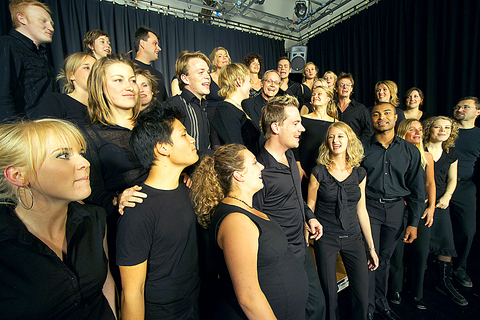Though Haitang Typhoon did its best to dampen the festive spirit during the first half of the Taipei International Choral Festival, there are still several good reasons to make it to the National Concert Hall for the festival's last three days, rain or shine.
Those reasons are Denmark's Vocal Line, Canada's Winnipeg Singers and several local choral groups including the Semiscon Vocal Band, Formosa Singers, the Taipei Philharmonic Choir, and various school choirs.
Tonight's concert pairs Vocal Line with Taiwan's own Semiscon Vocal Band. The 30-member Vocal Line is dedicated to contemporary acapella ? jazz, pop and rock ? as well as some classical avant garde. If you were one of those kids in college that never missed a midnight acapella concert, you won't want to miss tonight's show, with arrangements from Joni Mitchell, Alicia Keys and more of your favorite singers. Acapella has a tendency to come out poorly in recordings, but Vocal Line's sound is stellar, which says something about how the group must sound live.

PHOTO COURTESY OF TAIPEI ARTS INTERNATIONAL ASSOCIATION
The three-year-old Taiwanese acapella sensation Semiscon Vocal Band is set to give their Danish counterparts a run for their money. With their creative use of voices, texture, rhythm and harmony, Semiscon takes the concept of imitating musical instruments to a new level. One of their hits is Soul Bossa Nova in which different members imitate trumpets, saxophones and a drum set. Semiscon is a group of performers as much as it is a group of singers and they get full marks for personality.
For a change of pace,
tomorrow's concert features more traditional choral music from around the world, provided by the Winnipeg Singers and the Formosa Singers. Founded in the 1930s, the Winnipeg Singers are regarded as one of Canada's finest choral ensembles with a repertoire spanning from the Renaissance to the present.
The choir's formative gigs were regular broadcasts on CBC radio in the 1970s, where they explored both sacred and secular music. Each year the Winnipeg Singers commissions new works by Canadian composers, and tomorrow night's lineup also includes Russian composer Sergei Rachmaninov and US composer Samuel Barber.
The Formosa Singers, who are dedicated to "expressing the essence of Taiwan in song," will treat audiences to new arrangements of old folk songs -- Hakka, Hokkien, Aboriginal and Japanese -- and they'll throw in a few contemporary world masterpieces for good measure.
For the most acts stuffed into one night, buy your tickets for the Festival's final concert on Sunday, which brings back acts from earlier in the week such as the Parahyangan Catholic University Choir from Indonesia and the Orfeon Chamber Choir from Turkey. The Vocal Line will also be performing, as will the Taipei Philharmonic Chorus and Orchestra. Solo acts include a soprano, a tenor and a rapper.
Tickets, priced from NT$300 to NT$1,500 are available through Artsticket: (02) 3393 9888, or www.artsticket.com.tw. The National Concert Hall is at 21-1 Zhongshan S Rd, Taipei
(

Growing up in a rural, religious community in western Canada, Kyle McCarthy loved hockey, but once he came out at 19, he quit, convinced being openly gay and an active player was untenable. So the 32-year-old says he is “very surprised” by the runaway success of Heated Rivalry, a Canadian-made series about the romance between two closeted gay players in a sport that has historically made gay men feel unwelcome. Ben Baby, the 43-year-old commissioner of the Toronto Gay Hockey Association (TGHA), calls the success of the show — which has catapulted its young lead actors to stardom -- “shocking,” and says

The 2018 nine-in-one local elections were a wild ride that no one saw coming. Entering that year, the Chinese Nationalist Party (KMT) was demoralized and in disarray — and fearing an existential crisis. By the end of the year, the party was riding high and swept most of the country in a landslide, including toppling the Democratic Progressive Party (DPP) in their Kaohsiung stronghold. Could something like that happen again on the DPP side in this year’s nine-in-one elections? The short answer is not exactly; the conditions were very specific. However, it does illustrate how swiftly every assumption early in an

Inside an ordinary-looking townhouse on a narrow road in central Kaohsiung, Tsai A-li (蔡阿李) raised her three children alone for 15 years. As far as the children knew, their father was away working in the US. They were kept in the dark for as long as possible by their mother, for the truth was perhaps too sad and unjust for their young minds to bear. The family home of White Terror victim Ko Chi-hua (柯旗化) is now open to the public. Admission is free and it is just a short walk from the Kaohsiung train station. Walk two blocks south along Jhongshan

Francis William White, an Englishman who late in the 1860s served as Commissioner of the Imperial Customs Service in Tainan, published the tale of a jaunt he took one winter in 1868: A visit to the interior of south Formosa (1870). White’s journey took him into the mountains, where he mused on the difficult terrain and the ease with which his little group could be ambushed in the crags and dense vegetation. At one point he stays at the house of a local near a stream on the border of indigenous territory: “Their matchlocks, which were kept in excellent order,